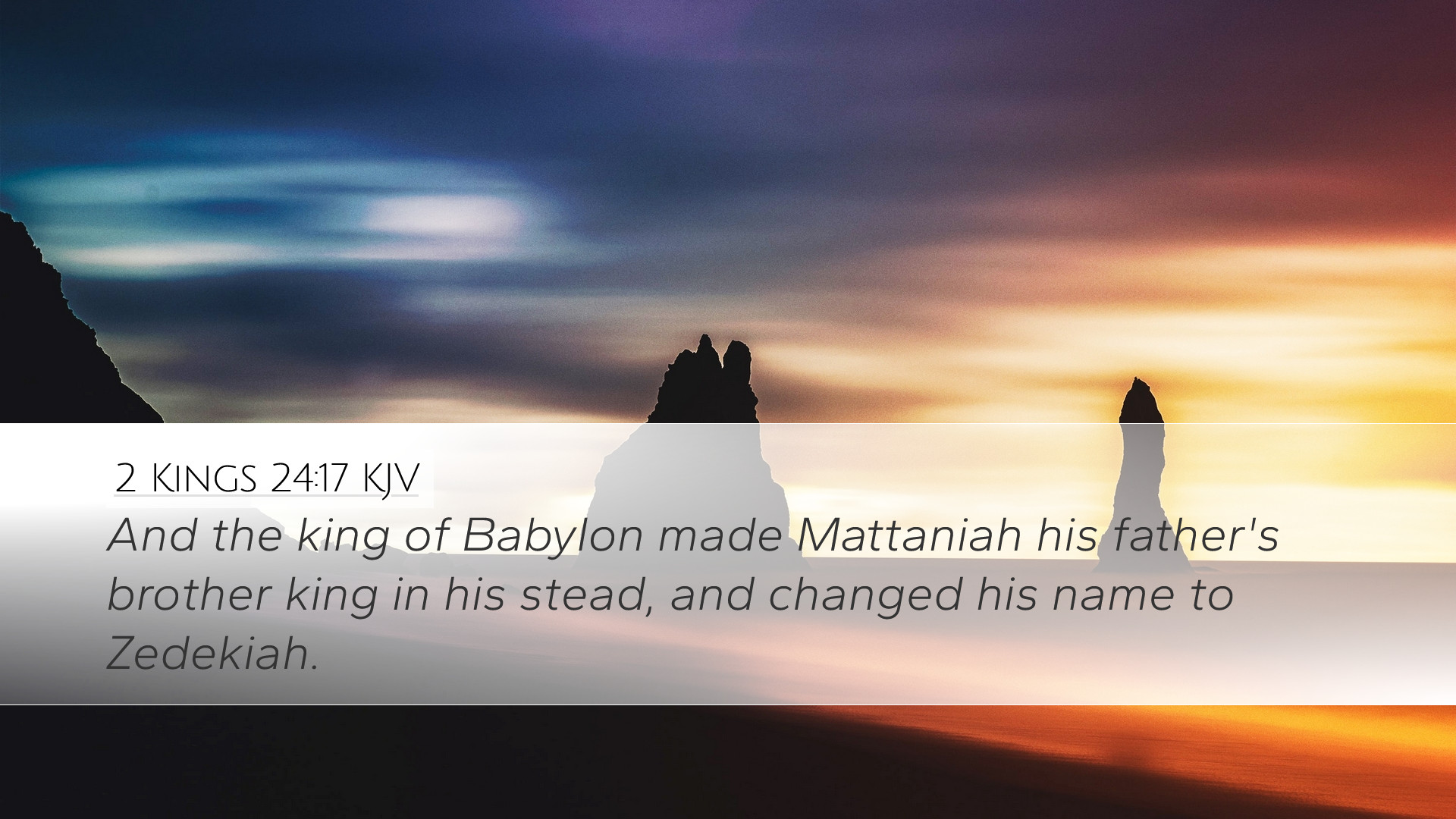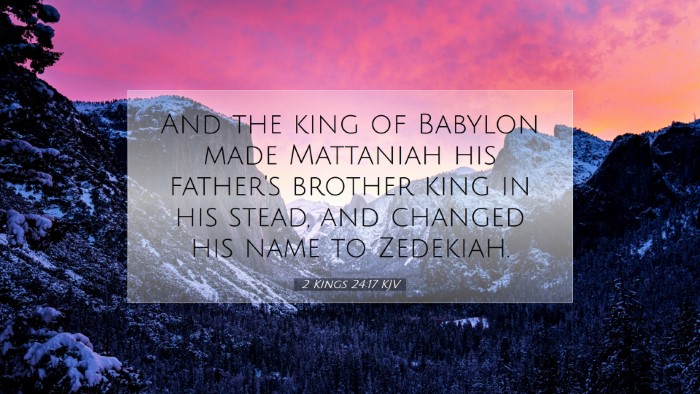Old Testament
Genesis Exodus Leviticus Numbers Deuteronomy Joshua Judges Ruth 1 Samuel 2 Samuel 1 Kings 2 Kings 1 Chronicles 2 Chronicles Ezra Nehemiah Esther Job Psalms Proverbs Ecclesiastes Song of Solomon Isaiah Jeremiah Lamentations Ezekiel Daniel Hosea Joel Amos Obadiah Jonah Micah Nahum Habakkuk Zephaniah Haggai Zechariah Malachi2 Kings 24:17
2 Kings 24:17 KJV
And the king of Babylon made Mattaniah his father's brother king in his stead, and changed his name to Zedekiah.
2 Kings 24:17 Bible Commentary
Commentary on 2 Kings 24:17
Verse: 2 Kings 24:17 - "And the king of Babylon made Mattaniah his father's brother king in his stead, and changed his name to Zedekiah."
Introduction
This verse serves as a significant transitional moment in the history of Judah and highlights the intricate relationship between the Davidic line and the foreign power of Babylon. The naming of Zedekiah marks a pivotal shift in the Kingdom's governance and foreshadows the ensuing events that lead to the Babylonian captivity.
Historical Context
The geopolitical landscape of the time was marked by Babylon's ascendancy under Nebuchadnezzar II. Following the capture of Jehoiachin, the rightful king, the Babylonians installed Zedekiah, whose original name was Mattaniah. This act of changing names was not only symbolic of subjugation but also an assertion of Babylonian authority over Judah, reflecting the influence of imperial powers in the governance of client states.
Insights from Commentaries
Matthew Henry’s Commentary
Matthew Henry emphasizes the providential hand of God in the affairs of nations. He remarks that the appointment of Zedekiah was in accordance with God’s judicial action against Judah’s rebellion and idolatry. Henry points out that despite Zedekiah being of the line of David, his reign was characterized by a lack of piety and failure to heed the prophetic warnings given through Jeremiah.
Albert Barnes’ Notes
Barnes presents a detailed analysis of Zedekiah’s character and his initial stance as a puppet king. He highlights how Zedekiah began his reign under Babylon’s watchful eye, initially showing promise; however, Barnes notes that Zedekiah’s decision to rebel against Babylonized his fate and resulted in catastrophe for Judah. Zedekiah’s weak leadership is depicted as influencing the larger theology of suffering that the Jews faced during this time, linking it to divine judgment for their transgressions.
Adam Clarke’s Commentary
Clarke explores the implications of Zedekiah's name change and its significance. The name Zedekiah means "The Lord is righteous," indicating a striking contrast between his namesake's life and the meaning of his name. Clarke remarks on the personal dimensions of kingship in Israel, where a ruler's moral integrity was often seen as reflective of the nation's relationship with God. Through Zedekiah, Clarke stresses the tragic consequences of a leader who strays from his purpose, leading his people toward doom instead of restoration.
Theological Reflections
This verse raises profound theological questions about leadership, governance, and divine sovereignty. It serves as a reminder for modern believers about the significance of covenant fidelity and the character of leadership. As Zedekiah ruled with a veneer of authority yet failed to align himself with God’s will, pastors and theologians today must be vigilant against similar pitfalls, thereby teaching congregations the importance of righteous leadership rooted in humility and obedience to divine instructions.
Key Themes
- Divine Sovereignty: The oversight of God in the rise and fall of kings highlights God’s eternal authority over nations.
- Covenant Faithfulness: Judah’s leaders are held accountable to their covenant with God, underscoring that national calamity often follows the unfaithfulness of leaders.
- Judgment and Mercy: The events leading to Zedekiah’s reign illustrate God’s judgment against rampant sin yet also hint at the provision for future restoration.
Conclusion
In summary, 2 Kings 24:17 not only marks a significant moment in Judah's history with the enthronement of Zedekiah but also encapsulates critical theological principles relevant for today’s believers. The verse challenges every leader to reflect on the weight of their responsibility and the impact of their choices on the lives of those they govern. As scholars and students of the Bible delve into this passage, the lessons gleaned from the failures of Zedekiah will resonate for generations, urging both individual and corporate alignment with God’s divine purposes.
Reflections for Further Study
Readers are encouraged to further explore the implications of Zedekiah’s reign in light of the prophetic messages delivered by Jeremiah. Considering how biblical history weaves together the narratives of kingship, divine accountability, and the promise of restoration, this examination can foster a deeper understanding of God’s unchanging nature amidst changing human circumstances.


